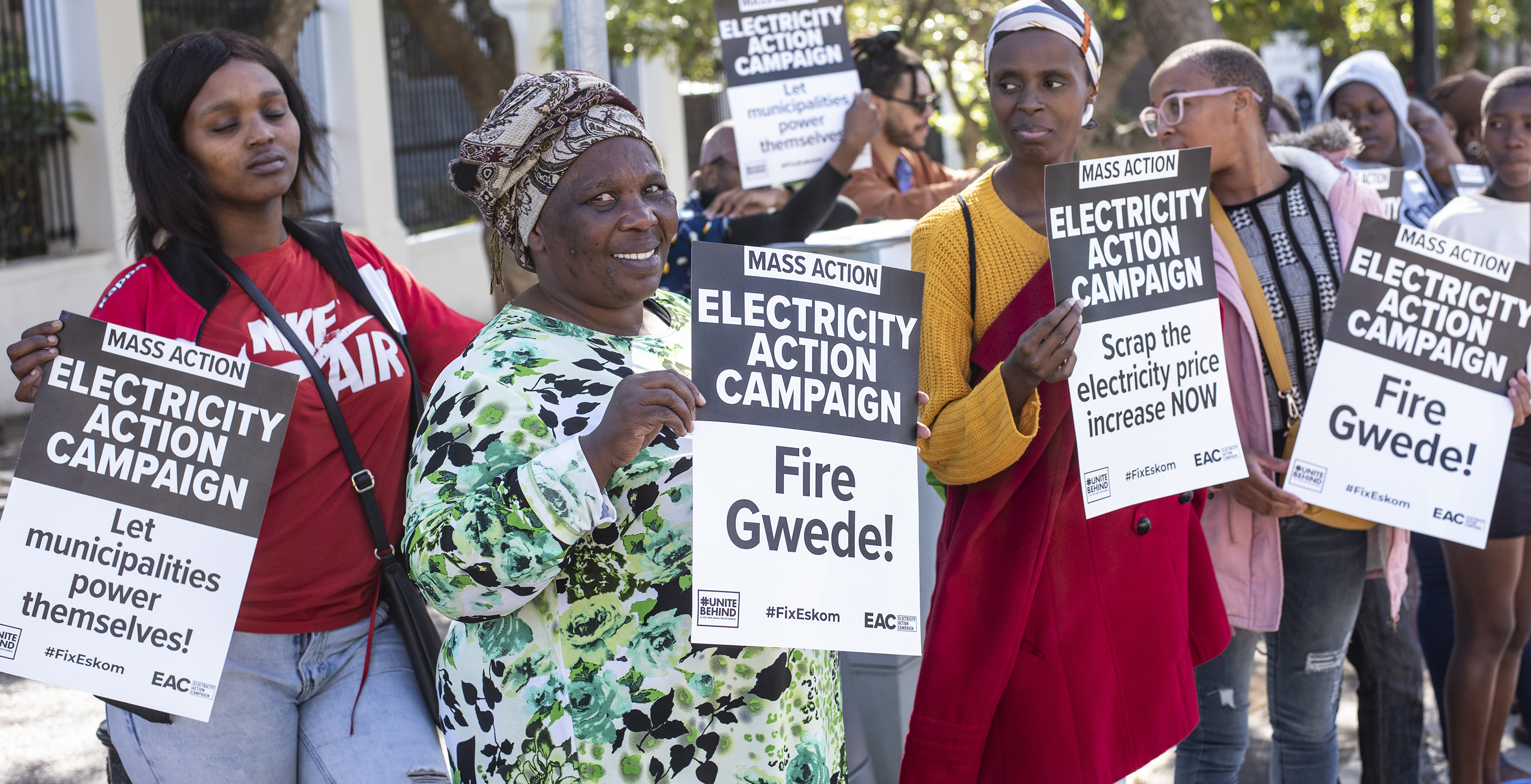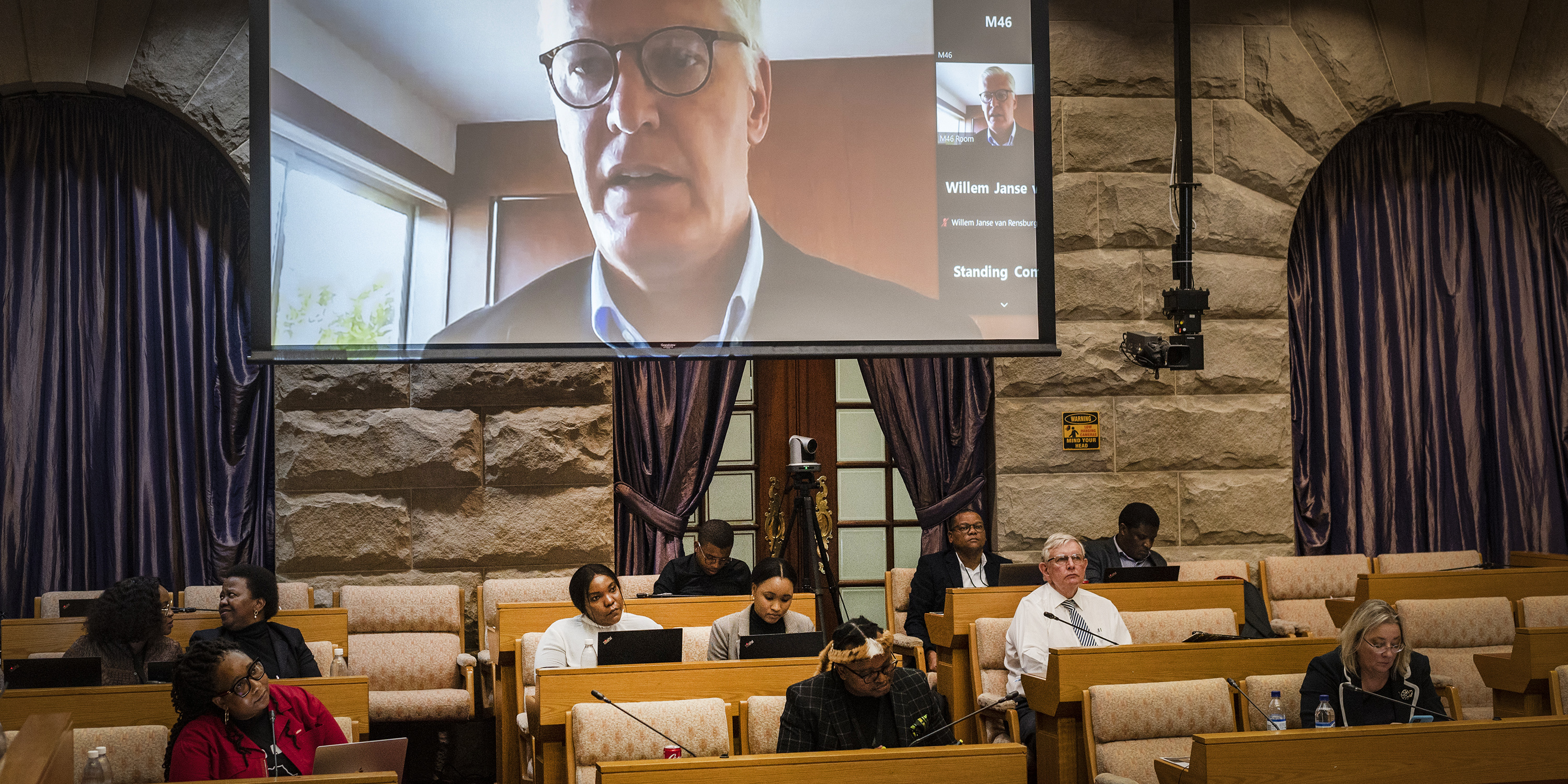MPs across the political divide in the Standing Committee on Public Accounts repeatedly questioned the former power utility boss André de Ruyter on his commitment to accountability, and disclosure, when he declined to name names in the abuse of public monies. Prepped and legally advised, he kept referring such questions to Public Enterprises Minister Pravin Gordhan and presidential security advisor Sydney Mufamadi.
“They were informed, and they know. I do not have immunity. I can’t make any statement that puts me at risk because of the fact because there is already a highly litigious environment around Eskom and my tenure at Eskom. I would be very loath to expose myself to any further litigation.”
That’s a reference without expressly saying so to the ANC litigation triggered by De Ruyter’s e.tv interview on My Guest Tonight in late February. His sharp comments on organised corruption and claim of the involvement of “high-ranking politicians” sparked pushback by the governing ANC — from Luthuli House’s legal action to ministerial commentary critical of his performance as Eskom CEO. Scheduled to leave Eskom at the end of March, De Ruyter departed immediately — some five weeks early.
Coincidentally, President Cyril Ramaphosa in a parliamentary written reply to DA leader John Steenhuisen in March said, “I was not briefed about the identities of people who are allegedly involved in cartels in Eskom”.
On Wednesday when asked by ANC MP Sakhumzi Somyo about the funding of the intelligence investigations that was shared with Gordhan, Mufamadi, but also the SAPS, State Security Agency (SSA) and Hawks, De Ruyter also remained tight-lipped.
 Mkhuleko Hlengwa, IFP member and Scopa chairperson during the appearance of former Eskom CEO Andre de Ruyter before Parliamentary Committee on 26 April, 2023 in Cape Town, South Africa. (Photo by Gallo Images/Brenton Geach/Gallo Images)
Mkhuleko Hlengwa, IFP member and Scopa chairperson during the appearance of former Eskom CEO Andre de Ruyter before Parliamentary Committee on 26 April, 2023 in Cape Town, South Africa. (Photo by Gallo Images/Brenton Geach/Gallo Images)
“The funds were made available by private donors... I do not wish to interfere in any ongoing criminal investigations, nor would I want to expose anyone, who wanted to support the combating of crime ... to the risk I myself and others of my executive have faced. It’s up to those individuals to decide whether to disclose.”
Throughout De Ruyter’s answers to MPs, a sense of closely guarded watchfulness prevailed. Perhaps less comfortable in the political — the backlash following the television interview appeared to end even Gordhan’s previously publicly stated support — De Ruyter was more at ease on technical matters.
Or in explaining his resignation on 12 December 2022 after his position had become untenable given the “self-styled engaged” newly appointed board headed by Mpho Makwana.
DA MP Alf Lees had asked directly whether the resignation was triggered by increased interference and overreach, by the board.
“Yes it did. It made my life challenging. Meetings were held with subordinates of mine without my knowledge and instructions were given. I experienced that as disempowering. I know colleagues (in the executive) had similar experiences... The engaged board did play a role in my life (as CEO) becoming untenable.”
ANC accusations rejected
But it was an important date with Scopa for De Ruyter on another point — the claims from the ANC, and ministers, he’d failed not only in his management responsibility of getting Eskom to deliver power but also in his fiduciary duties like reporting crime.
And so repeatedly emphasised was the meeting with Gordhan and Mufamadi in July 2022, and particularly the 4 June 2022 meeting with SAPS national commissioner Lieutenant-General Fannie Masemola, but also others like a 5 July 2022 meeting with NatJoints (National Joint Operational and Intelligence Structure) which brings together spooks, soldiers and police in an entity that is not established in law or regulation and that does not publicly account.
That 43 arrests had been made, a special task team established and that the Hawks raised black sites were corroborative that measures are paying off, De Ruyter repeatedly said.
Over the past year or longer Eskom has regularly and publicly reported about cases it has laid with police, and arrests. On Friday two Eskom employees and a truck driver for delivering a tanker of fuel that was R300,000 short of the full consignment for Kendall power station were arrested and appeared in court.
Just after noon, Wednesday’s Scopa meeting ended as had been agreed due to a commitment De Ruyter could not shift.
Importantly, to date, the Scopa meeting is the only step Parliament has taken to get to the bottom of this latest twist in Eskom corruption. In mid-March the ANC used its numbers in the House to vote down a proposed parliamentary probe into cartel organised crime at Eskom, describing De Ruyter’s claims as “childish” and “unsubstantiated”.
 United Behind protest outside Parliament during the appearance of former Eskom CEO Andre de Ruyter before the Parliamentary Committee on 26 April, 2023 in Cape Town, South Africa. (Photo: Gallo Images/Brenton Geach/Gallo Images)
United Behind protest outside Parliament during the appearance of former Eskom CEO Andre de Ruyter before the Parliamentary Committee on 26 April, 2023 in Cape Town, South Africa. (Photo: Gallo Images/Brenton Geach/Gallo Images)
It comes amid persistent Stage 6 rolling power cuts that leave South Africans up to 10 hours a day without electricity. And it takes place against mashed-up factional politicking from within the ANC that has shredded policy, and budgetary certainty with plans to burn diesel to keep the lights on while extending the lifespan of ageing, breakdown-prone coal power stations.
Parliament right now is dealing with the draft legislation to effect Eskom’s R254-billion debt bailout that the 2023 budget allocated over the next three years. This followed the 2019 Budget provision of a R59-billion bailout alongside annual instalments of R23-billion each over 10 years. In 2015 Eskom the R60-billion Eskom got as a loan in 2008 was converted into equity, which does not have to be repaid.
From De Ruyter's prepared submission to Scopa, a level of frustration seems to emerge. Controls to curb corruption, fraud and cartel organised crime at state power utility Eskom failed largely because of active resistance and circumvention of controls — and an “active campaign of sabotage”.
Measures to tighten controls like barcoding, inventory checks, outsourcing procurement were “actively resisted and circumvented, necessitating ongoing time-consuming micromanagement to ensure implementation took place”, said De Ruyter in his statement to MPs.
“Numerous incidents of damage to and sabotage of Eskom property have taken place. In a number of cases, it is clear that damage to Eskom property and operations has been deliberate.”
Scopa later on Wednesday decides on a special inquiry that was mooted several weeks ago, which would entail also calling others like the Hawks, SAPS and the board before it. DM




 United Behind protest outside Parliament during the appearance of former Eskom CEO Andre de Ruyter before the Parliamentary Committee on 26 April, 2023 in Cape Town, South Africa. (Photo: Gallo Images/Brenton Geach/Gallo Images)
United Behind protest outside Parliament during the appearance of former Eskom CEO Andre de Ruyter before the Parliamentary Committee on 26 April, 2023 in Cape Town, South Africa. (Photo: Gallo Images/Brenton Geach/Gallo Images) 